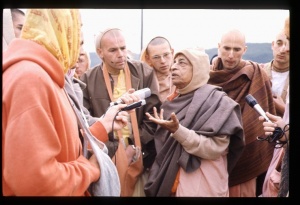SB 1.2.25 (1962): Difference between revisions
(Created page with '<div style="float:left">'''Goto SB 1.2.25 Current Edition'''</div> <div style="float:right">[[File:Go-previous.png|link=SB 1962 Second Chapter - Divinity and Devoti…') |
(Vanibot #0020: VersionCompareLinker - added a link to the Version Compare feature) |
||
| Line 1: | Line 1: | ||
<div style="float:left">'''[[SB | [[Category:Srimad-Bhagavatam (1962-1965) - Canto 01 Chapter 02]] | ||
<div style="float:right">[[File:Go-previous.png|link=SB 1962 | <div style="float:left">[[File:Go-previous.png|link=SB (1962) Second Chapter - Divinity and Devotional Service]] '''[[SB (1962) Second Chapter - Divinity and Devotional Service]]'''</div> | ||
<div style="float:right">[[File:Go-previous.png|link=SB 1.2.24 (1962)]] '''[[SB 1.2.24 (1962)]] - [[SB 1.2.26 (1962)]]''' [[File:Go-next.png|link=SB 1.2.26 (1962)]]</div> | |||
{{CompareVersions|SB|1.2.25|SB 1962|SB 1972-77}} | |||
{{RandomImage}} | {{RandomImage}} | ||
| Line 6: | Line 8: | ||
==== TEXT No. 25 ==== | ==== TEXT No. 25 ==== | ||
<div class="SB65verse"> | |||
Bhejire munayo thagrey bhagwantama adhoksajam | |||
Satwan vishuddham kshemaya kalpante ye anu taniha. | |||
</div> | |||
==== ENGLISH SYNONYMS ==== | ==== ENGLISH SYNONYMS ==== | ||
<div class="synonyms"> | |||
<div | |||
Bhejire—rendered service unto, muuayothagrey—thus before all the sages, Bhagwantam—unto the Personality of Godhead, Adhoksjam—the transcendence, Satwam—existence, Vishuddham—above the three modes of nature, Kshemaya—for deriving the ultimate benefit, Kalpante—deserve, Ye—those, Anu—follow, Tan—those, Iha—in this material world. | Bhejire—rendered service unto, muuayothagrey—thus before all the sages, Bhagwantam—unto the Personality of Godhead, Adhoksjam—the transcendence, Satwam—existence, Vishuddham—above the three modes of nature, Kshemaya—for deriving the ultimate benefit, Kalpante—deserve, Ye—those, Anu—follow, Tan—those, Iha—in this material world. | ||
</div> | </div> | ||
| Line 22: | Line 23: | ||
==== TRANSLATION ==== | ==== TRANSLATION ==== | ||
<div class="translation"> | |||
<div | |||
All previous great sages rendered service unto the transcendental Personality of Godhead on account of His transcendental existence above the three modes of material nature,—for deriving ultimate benefit of being freed from the material conditions. Any one who follows such great authorities is also eligible for such liberation from this material world. | All previous great sages rendered service unto the transcendental Personality of Godhead on account of His transcendental existence above the three modes of material nature,—for deriving ultimate benefit of being freed from the material conditions. Any one who follows such great authorities is also eligible for such liberation from this material world. | ||
</div> | </div> | ||
| Line 30: | Line 30: | ||
==== PURPORT ==== | ==== PURPORT ==== | ||
<div class="purport"> | |||
<div | |||
The purport of performing religiosity is neither to profit by material gain nor to get the simple knowledge of discerning matter from spirit. The ultimate aim of religious performances is to get oneself released from the material bondage and regain the life of freedom in the transcendental world where the Personality of Godhead is the Supreme Person. Laws of religiosity are, therefore, directly enacted by the Personality of Godhead and except the Mahajans or the authorised agents of the Lord, no body knows the purpose of religiosity. There are twelve particular agents of the Lord who know the purpose of religiosity and all of them render transcendental service unto Him. Persons who desire their own good may follow these Mahajans and thus attain the Supreme benefit. | The purport of performing religiosity is neither to profit by material gain nor to get the simple knowledge of discerning matter from spirit. The ultimate aim of religious performances is to get oneself released from the material bondage and regain the life of freedom in the transcendental world where the Personality of Godhead is the Supreme Person. Laws of religiosity are, therefore, directly enacted by the Personality of Godhead and except the Mahajans or the authorised agents of the Lord, no body knows the purpose of religiosity. There are twelve particular agents of the Lord who know the purpose of religiosity and all of them render transcendental service unto Him. Persons who desire their own good may follow these Mahajans and thus attain the Supreme benefit. | ||
</div> | </div> | ||
<div style="float:left"> | <div style="float:left">'''[[SB 1.2.25|(Compare SB 1.2.25 Current Edition)]]'''</div> | ||
<div style="float:right">'''[[SB 1.2.26 (1962)]]'''[[File:Go-next.png|link=SB 1.2.26 (1962)]]</div> | <div style="float:right">[[File:Go-previous.png|link=SB 1.2.24 (1962)]] '''[[SB 1.2.24 (1962)]] - [[SB 1.2.26 (1962)]]''' [[File:Go-next.png|link=SB 1.2.26 (1962)]]</div> | ||
__NOTOC__ | __NOTOC__ | ||
__NOEDITSECTION__ | |||
Latest revision as of 10:46, 25 May 2020

A.C. Bhaktivedanta Swami Prabhupada
TEXT No. 25
Bhejire munayo thagrey bhagwantama adhoksajam Satwan vishuddham kshemaya kalpante ye anu taniha.
ENGLISH SYNONYMS
Bhejire—rendered service unto, muuayothagrey—thus before all the sages, Bhagwantam—unto the Personality of Godhead, Adhoksjam—the transcendence, Satwam—existence, Vishuddham—above the three modes of nature, Kshemaya—for deriving the ultimate benefit, Kalpante—deserve, Ye—those, Anu—follow, Tan—those, Iha—in this material world.
TRANSLATION
All previous great sages rendered service unto the transcendental Personality of Godhead on account of His transcendental existence above the three modes of material nature,—for deriving ultimate benefit of being freed from the material conditions. Any one who follows such great authorities is also eligible for such liberation from this material world.
PURPORT
The purport of performing religiosity is neither to profit by material gain nor to get the simple knowledge of discerning matter from spirit. The ultimate aim of religious performances is to get oneself released from the material bondage and regain the life of freedom in the transcendental world where the Personality of Godhead is the Supreme Person. Laws of religiosity are, therefore, directly enacted by the Personality of Godhead and except the Mahajans or the authorised agents of the Lord, no body knows the purpose of religiosity. There are twelve particular agents of the Lord who know the purpose of religiosity and all of them render transcendental service unto Him. Persons who desire their own good may follow these Mahajans and thus attain the Supreme benefit.